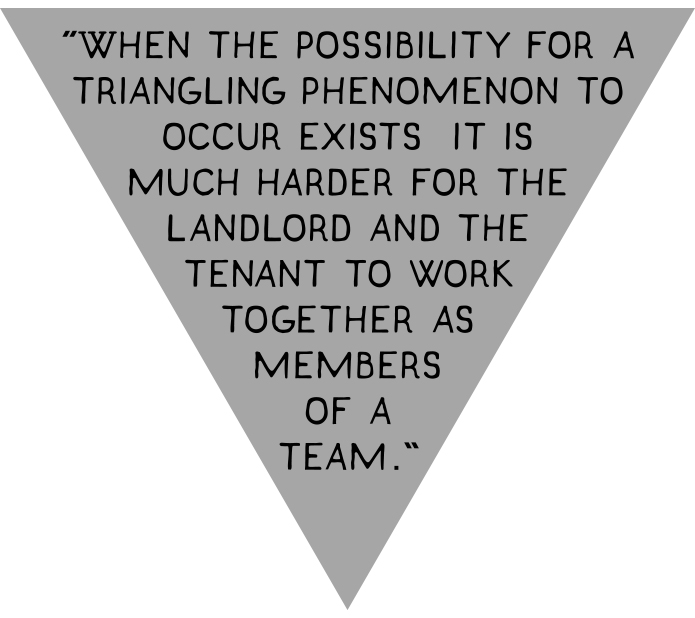
The situation is familiar to every commercial property owner: The lease was signed with great optimism and without extensive negotiation, except for some discussion of the rent and other charges. But now, several years into the lease, the tenant is unhappy about something. The landlord is still collecting rent, but the tenant is grumbling and discontented. Maybe they think that they’re not getting enough customer traffic, that they’re paying too much in common charges, or they now believe that they didn’t strike the best bargain when they negotiated the lease. The lease document itself doesn’t provide any answers. It was drafted with an eye to specifying the payments due and protecting the owner from incurring losses in any number of situations.
What should be done about the situation? The landlord’s first instinct may be to do nothing. The lease has been signed and he or she is collecting rent. What’s the worst thing that could happen? Ignoring the tenant, however, can lead to unfortunate outcomes for both parties. In an ideal tenant/landlord relationship, the two will work together as a team. If the landlord drops out of the game, the tenant may have to take actions to get them back in play. That’s the point at which the tenant may decide to involve others. If the landlord works with a property management company, the tenant could go to another one of your coworkers. They could leave the company bad reviews on Yelp or begin telling their neighbors about how they are being mismanaged. They are pulling others onto their side. This is the beginning of a phenomenon commonly referred to as “triangling.” The harm that can be caused by “triangling” has the potential of being much more substantial than the original complaint warranted. Triangling stifles diversity of voice by creating coalitions in which being against something else is the only thing holding people together. Approaching people and difficult real estate transactions in a relational way makes room in the interaction for differences that do not have to divide people or derail deals. Let’s look harder at the triangling, and some of the benefits that can come out of being aware of the dangerous phenomenon.
Triangling is a strategy you may have learned on the playground as a child or seen in your home of origin thousands of times. It is an unhealthy way to build partnerships, generally in order to gain power. As the coalition builds, demonization of a third person may get exaggerated and distorted in order to draw in as many people as possible, even if they are objectively reasonable and neutral.
When triangling happens, “camps” begin to form. Certain groups of people who feel cozy with each other alienate themselves from other groups who are doing the same kind of triangling amongst themselves. They all become disconnected from each other and often the original problem, the real concern held by the vast majority of people (in this case, that the lease isn’t functioning well), goes unattended, unaddressed. In its place is created an additional problem: the malcontent of gossip and the politics of destructive coalitions.
The tenant has a complaint, and they are coming to the landlord first. They obviously respect the landlord. They are looking for an ear. The easiest way to make sure that conflict doesn’t escalate out of the boundaries of the tenant and landlord’s relationship is for the landlord to sit down with the tenant and engage with them directly to fully hear their issues. Engaging in a dialogue generally leads to better outcomes. The conversation might be complex and difficult, and it may also have legal implications, since any agreements made in discussions with the tenant might need to be documented. The difficulties and risks associated with talking to the tenant directly often make property owners reluctant to do so, even though, intuitively, it is the sensible thing to do. This is where a mediator can be very helpful; navigating the conversation in order to keep triangling to a minimum and deescalate the conflict is not impossible, especially if the issue is minimal.

What would that look like? The tenant brings the complaint to the landlord, and the landlord chooses to engage with the tenant. The landlord pauses and listens fully, not yet responding. He or she finds the center within themselves by focusing on breathing. He or she listens to the complaint and suspends their judgment. When the tenant is finished voicing their concerns, the landlord reflects back exactly what they said, their stated meaning, not the landlord’s interpretation and repeats this as necessary. The tenant is likely to calm down and soften the rough edges of their complaint. They are also likely to expand on the complaint and get underneath to a core concern that is often rooted in fear. From there, both the landlord and the tenant can make better decisions about how to move forward.
When the possibility for a triangling phenomenon to occur exists, it is much harder for the landlord and the tenant to work together as members of a team. By being aware of triangling and working to address problems with tenants head on, the tenant will feel as though his or her voice is being heard rather than crushed. He or she will not feel like they have to go to an external resource if they know that the landlord is on their side. Doing so can help landlords and tenants work together to make the partnership beneficial and inclusive.
Being aware and responsive to potential triangling situations will also help you to promote diversity of voice in real estate dealings. When the landlord is engaged with the tenant, he or she can more clearly understand the areas in which they need to improve. Working to improve those areas will increase the quality of the business and of the landlord’s dealing with their clients, and will also help them to integrate more of the client’s voice into their work. Allowing for the client’s voice to emerge as soon as possible is the best way to make sure that the landlord is avoiding problems down the road and including as many voices as possible while the deal is being struck.


 Login
Login
